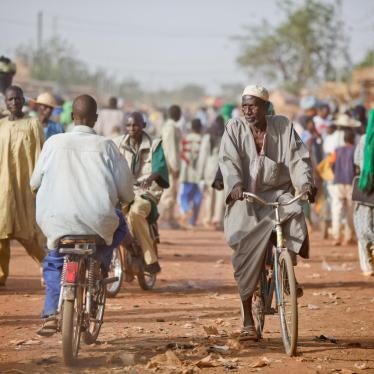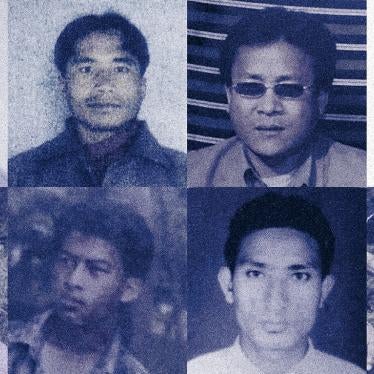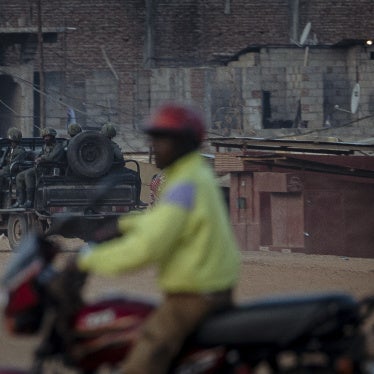It was 3:25 a.m. on March 3 in Dobley, Somalia, when the missile hit, scattering shrapnel in a wide arc and piercing the thin wooden walls of Mohamed Nuuriye Salaad's house. Shrapnel sliced into Salaad's eldest daughter, 15-year-old Amina, tearing open the skin between her ear and mouth. Amina didn't receive medical care for days, not until she could be smuggled across the Kenyan border.
Five others who were wounded tended to their injuries on their own.
The two Tomahawk missiles launched toward Dobley were the fourth U.S. airstrike aimed at individuals with Al Qaeda links in Somalia since January 2007. U.S. government officials claim that the latest strikes targeted Saleh Ali Saleh Nabhan, a Kenyan suspected of involvement in the 2002 bombings of a Kenyan resort and the 1998 U.S. embassy bombings in Africa. The strike also might have been targeting Hassan Turki, a Somali leader of the Islamist group Itihaad al Islamiya, which is on U.S. and U.N. lists of terrorist groups.
Four days after the missile strike, however, Turki appeared to speak in one of Dobley's mosques after morning prayers. He used the attack for his own purposes, condemning the gaalo (unbelievers) and warning that any white people in the area, including aid workers, would be viewed as spies. Earlier that week, hundreds of Dobley residents reportedly joined an impromptu protest, marching through the streets and shouting anti-American slogans.
The Bush administration justifies such missile strikes by claiming that the United States is engaged in a global war against Al Qaeda and that it is legally entitled to annihilate any alleged Al Qaeda member just about anywhere in the world. To be fair, the administration insists that it will not, as a matter of policy, shoot alleged terrorists on the streets of London -- or in any other region where a functioning government is willing and able to arrest, detain or otherwise take action against those deemed to be terrorists. But southern Somalia is a fairly lawless place, and absent a dangerous ground mission, missiles are arguably one of the only ways that the U.S. can strike at Al Qaeda suspects there.
But at what cost? Whether the missiles were aimed at Nabhan or Turki, they hit civilians instead. This pattern echoes U.S. strikes in Somalia in January 2007 that killed and injured an unknown number of civilians as the stated target scampered off unharmed. Even if the attacks could be legally justified under the laws of war -- which is by no means clear -- the high-profile civilian casualties inevitably turn ordinary Somalis against the United States, thereby bolstering support for militant groups. Meanwhile, the human rights and humanitarian crisis that terrorists feed off -- and that U.S. policies exacerbate -- is largely ignored.
Fifteen months ago, the Bush administration supported a full-scale Ethiopian military offensive that ousted the ruling Islamist authority from Mogadishu and installed a weak but internationally backed transitional government. The intervention triggered a predictable insurgency by both Islamist militants and ordinary Somalis, who view Ethiopia as a historic foe.
Ethiopian and Somali troops together are fighting against a coalition of insurgents demanding Ethiopian withdrawal. The escalating conflict has killed thousands of Somali civilians and forced up to 700,000 people -- 60% of the residents of Mogadishu -- to flee the city. Insurgents, Ethiopian troops and Somali government forces have each committed serious crimes -- mutilating captured soldiers, bombarding residential blocks and hospitals, and systematically looting homes, respectively.
The result? An unsurprising growth in anti-Western and anti-American sentiment among Somalis who never supported radical Islamist movements before. Fifteen months after the Ethiopian invasion, insurgents are gaining strength in Mogadishu and other areas of the country, capitalizing on the anger and resentment caused by these atrocities. Credible reports indicate that Islamist recruitment of Somali youth is growing, a backlash that will complicate U.S. counter-terrorism goals long into the future.
Eliminating a few alleged terrorists will not solve these deeper problems. An effective counter-terrorism policy must address the underlying human rights and humanitarian tragedies that are fueling the crisis.
This will mean ending Ethiopia's blank check to commit abuses, conditioning support for Somalia's transitional government on evidence that it is no longer attacking civilians, supporting an independent commission of inquiry to document the abuse and meeting the humanitarian needs of thousands of internally displaced people -- all steps the United States should support when the U.N. Security Council meets next week to discuss the worsening crisis in Somalia.
Acknowledging and properly responding to the human rights crisis will do more to create a stable Somalia -- and reduce terrorism -- than a few high-profile, high-cost and low-success targeted killings.
Jennifer Daskal is senior counter-terrorism counsel for Human Rights Watch. Leslie Lefkow is senior researcher on the Horn of Africa for Human Rights Watch.








